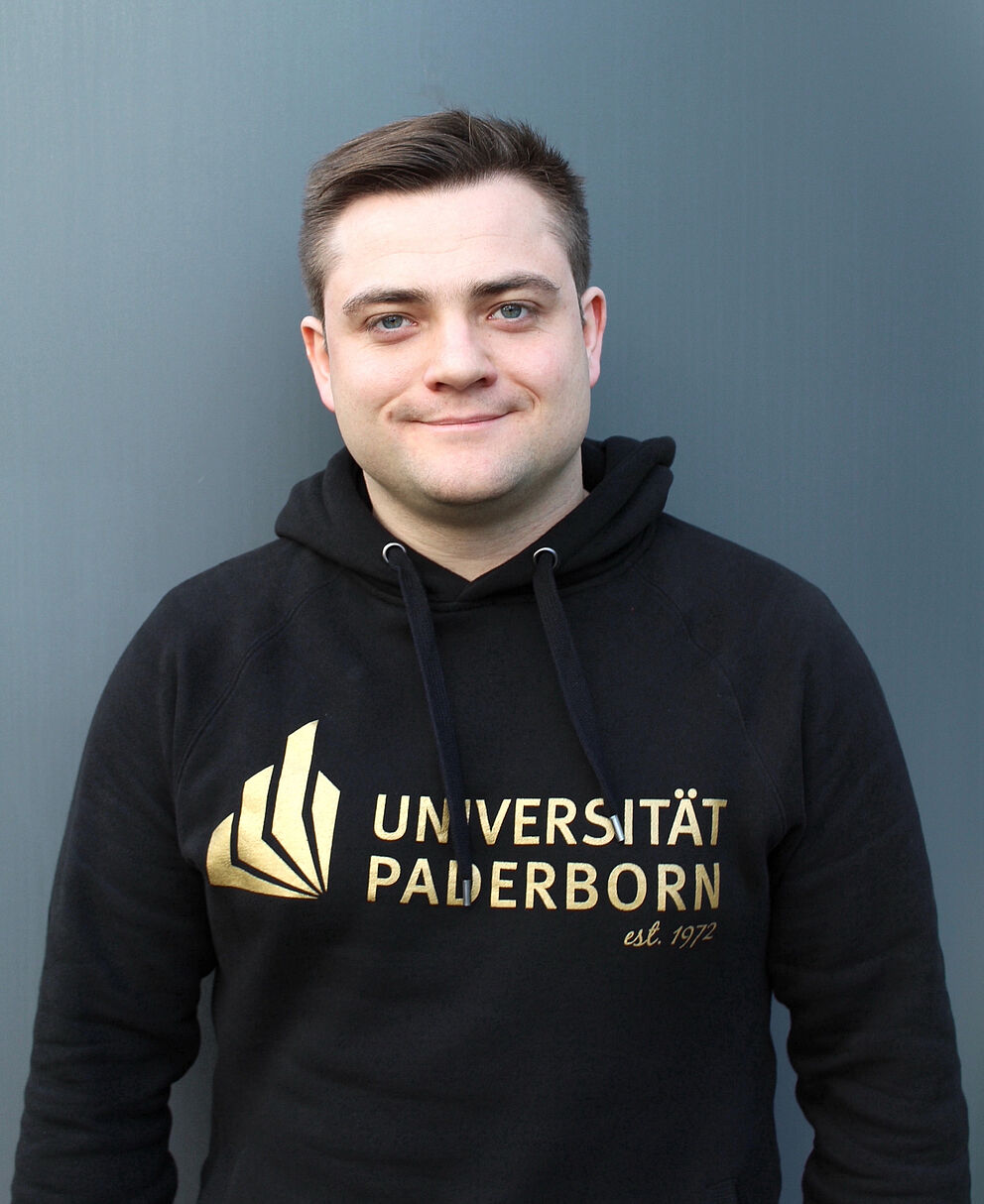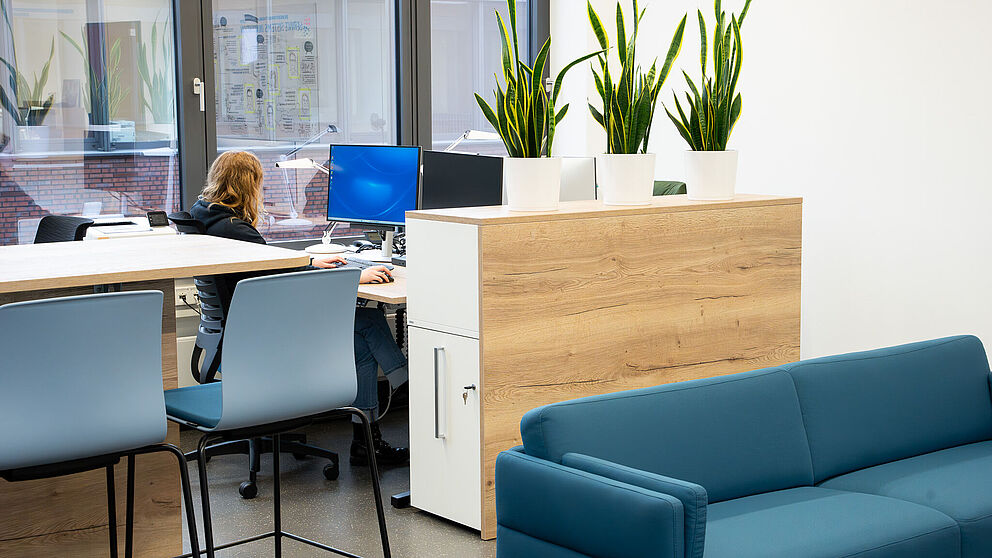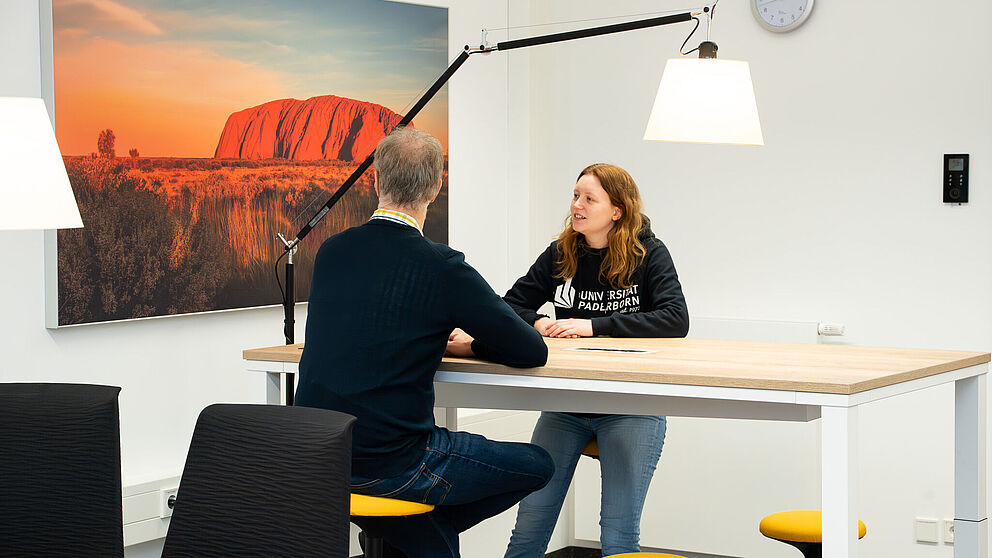Project seminars: Subject area and solution competence in a team
A project seminar is an application-oriented seminar in which Master's students work in teams to develop and evaluate pre-competitive solutions to operational problems. They apply classic and agile project management methods to plan, control and monitor the development of innovative solutions. The subject of a project seminar at our university is the development of digital services or new operational information systems and their realisation through the implementation of suitable information technology. Students work together in a project group to determine requirements and to develop, implement and evaluate services and information technology in terms of specialised concepts.
Topics of our project seminars
Generative Artificial Intelligence und die Gestaltung von Smart Service Systems
Generative künstliche Intelligenz (Generative KI bzw. GenAI) steht heute für eine neue Generation digitaler Werkzeuge: Sie geht über rein analytische KI-Funktionen hinaus und ermöglicht, basierend auf riesigen Datenmengen, die Synthese neuartiger Inhalte und Lösungen. Anwendungen wie das Large Language Model ChatGPT (OpenAI 2025a), Bild- und Videogeneratoren wie DALL·E (Open AI 2025b), Midjourney (2025) oder Sora (OpenAI 2025c) demonstrieren eindrucksvoll, wie Computer in der Lage sind, aus Nutzereingaben eigenständig kreative Ideen, Texte, Designs oder Software-Code zu entwickeln. Die stetige Weiterentwicklung von GenAI hat einen tiefgreifenden Wandel in der Arbeitswelt, der Dienstleistungserbringung und dem Innovationsprozess eingeläutet.
Um Potenziale von GenAI optimal zu nutzen, ist es wichtig, den Kontext zu verstehen, in dem digitale Dienstleistungen erbracht werden. Ein Dienstleistungssystem (engl. Service System) beschreibt die gemeinsame Wertschöpfung von Anbietern und Kunden in vielen denkbaren Konstellationen - von industriellen Anwendungen bis zu kulturellen oder kommunalen Dienstleistungen (DIN SPEC 33453). Dabei stellen beteiligte Akteure im Service System Ressourcen bereit und kooperieren, um bestmögliche Leistungsergebnisse zu erzielen. Smart Service Systems sind eine spezielle Form solcher Systeme, bei denen intelligente, digital vernetzte Objekte die Rolle eines Schnittstellenobjekts übernehmen (DIN SPEC 33453, Beverungen et al. 2019a und 2019b). So nimmt z.B. ein Elektroauto eine wichtige Schnittstellenfunktion im Smart Service System „Nachhaltige Mobilität“ ein, das Menschen, Unternehmen und öffentliche Daten miteinander verbindet.
Unternehmen und Organisationen stehen vor der Herausforderung, die Technologie so einzusetzen, dass Innovationen unterstützt und die Leistungserstellung im Tagesgeschäft verbessert wird (Benlian et al. 2022; Brynjolfsson, Li & Raymond 2023). Gleichzeitig eröffnet sich die Chance, GenAI nicht nur als „Plug-and-Play“ Werkzeug einzusetzen, sondern bewusst und gezielt so zu gestalten, dass sie menschliche Akteure im Smart Service Systems Engineering bestmöglich unterstützt. Dabei geht es insbesondere darum, wie die Interaktion zwischen menschlichen und nicht-menschlichen Agenten (Wilga et al. 2024) gestaltet und weiterentwickelt wird, wie GenAI als "Co-Designer" funktionieren kann und sollte, und welche Rahmenbedingungen die Zusammenarbeit produktiv und verantwortungsvoll machen.
Charakter und Organisation des Projektseminars
Gegenstand des Projektseminars Smart Service am Lehrstuhl für Wirtschaftsinformatik, insb. Betriebliche Informationssysteme, im kommenden Wintersemester 2025/26 ist es, GenAI als Co-Designer im Smart Service Systems Engineering zu gestalten, verschiedene Interaktions- und Gestaltungsszenarien zu entwickeln, prototypisch umzusetzen und iterativ zu evaluieren.
Ein Projektseminar ist ein anwendungsbezogenes Seminar, in dem Masterstudierende im Team vorwettbewerbliche Lösungen für betriebliche Probleme erarbeiten und evaluieren. Dabei wenden sie klassische und agile Projektmanagement-Methoden an, um die Entwicklung innovativer Lösungen zu planen, zu steuern und zu überwachen. Die Studierenden organisieren das Projektseminar eigenständig und stimmen ihr Vorgehen mit den wissenschaftlichen Betreuern ab. Hierdurch lernen die Studierenden Fach- und Methodenwissen auf dem neuesten Stand.
Handlungsfelder und Vorgehen im kommenden Projektseminar
Gegenstand des Projektseminars ist die Analyse und Gestaltung von Anwendungen der Generative AI für (Smart) Service Systems mit besonderem Fokus auf die Rolle von GenAI als Co-Designer im Entwicklungsprozess. GenAI kann beispielsweise die Entwicklung neuer Smart Service Systems erheblich beschleunigen und verbessern, indem sie kreative Geschäftsmodellideen auf Grundlage großer Datenmengen generiert, visualisiert und bewertet. Hierbei kann das vom Lehrstuhl federführend entwickelte Vorgehensmodell des Smart Service Systems Engineering (DIN SPEC 33453) weiterentwickelt und durch rekombinante Dienstleistungsinnovationen (Beverungen, Lüttenberg & Wolf 2018) bereichert werden. Darüber hinaus können Prozesse durch den gezielten Einsatz von GenAI effizienter gestaltet werden. Die Technologie bietet zudem Potenziale, Restriktionen bei der Inanspruchnahme von Dienstleistungen abzubauen und die Entwicklung einer digital verantwortungsbewussten Gesellschaft (Trier et al. 2023) zu fördern. Dabei könnten Konzepte des Continuous Value Shaping (Böhmann et al. 2025) als integrativer Rahmen die kontinuierliche, adaptive und wertorientierte Gestaltung von Dienstleistungsinnovationen in dynamischen, digitalen Ökosystemen unterstützen. Durch iterative, interaktive und institutionalisierende Prozesse kann die nachhaltige Entwicklung und Anpassung von Services unterstützt werden, wodurch sich gesellschaftliche, ökologische und ökonomische Werte beim Einsatz digitaler Technologien besser realisieren lassen
Im Projektseminar lernen die Studierenden verschiedene Software-Werkzeuge der GenAI kennen und untersuchen deren Anwendungsszenarien in der Entwicklung von (Smart) Service Systems. Ausgewählte Ideen werden im Rahmen von Software-Prototypen weiterentwickelt, insbesondere im Hinblick auf die Gestaltung der Mensch-AI-Interaktion und deren Wirkung auf Innovationsprozesse. Die Prototypen werden empirisch evaluiert, sodass die Studierenden sich intensiv mit den Eigenschaften, Nutzungsversprechen, Herausforderungen und Implikationen dieser neuesten Technologiegeneration für die betriebliche Wertschöpfung und Innovationsprozesse auseinandersetzen.
Operative Umsetzung und Bewertung des Projektseminars
Das Projekt wird in einem Team aus vier bis fünfzehn Studierenden eigenständig an der Universität Paderborn bearbeitet. Es ist die wissenschaftliche Problemstellung zu adressieren, wie Generative AI im (Smart) Service System Engineering gestaltet und eingesetzt werden sollte. Das Projekt umfasst technische, fachkonzeptionelle, organisatorische, strategische und ethische Aspekte. Durch dieses breite Portfolio eignet sich das Projektseminar für Studierende aller Studiengänge der Fakultät für Wirtschaftswissenschaften, unabhängig von Programmierkenntnissen. Das Seminar wird in enger Zusammenarbeit mit Praxispartnern durchgeführt, die reale Anwendungsfälle und Herausforderungen einbringen. Durch die praxisorientierte Projektarbeit bekommen Studierenden die Möglichkeit, wertvolle Erfahrungen in der Anwendung von Methoden zur Gestaltung innovativer Smart Service Systeme, die unmittelbar mit aktuellen Problemstellungen aus der Praxis verknüpft sind.
Studierende erstellen zunächst eine eigene Kurzausarbeitung im Themenfeld und präsentieren diese vor dem Projektteam. Anschließend beginnt die Projektarbeit im Team. Im Rahmen einer Zwischenpräsentation werden die Vorgehensweise sowie erste Zwischenergebnisse vorgestellt und verteidigt. Zum Projektabschluss werden die Ergebnisse und Handlungsempfehlungen der interessierten Öffentlichkeit im Rahmen einer öffentlichen Abschlusspräsentation vorgestellt. Das Projektteam dokumentiert das Vorgehen und die entwickelten Ergebnisse in einem Projektbericht, der zusammen mit der Abschlusspräsentation die Grundlage für die Benotung bildet. Projektbegleitend werden Interviews und Workshops mit Beschäftigten der Praxispartner durchgeführt werden.
Anmeldung und weitere Hinweise
Bitte melden Sie sich via PAUL zu diesem Projektseminar an. Sollten wir mehr Anmeldungen erhalten als Plätze zur Verfügung stehen, müssen wir ggfs. eine Auswahl treffen.
Weitere formale Hinweise zum Projektseminar finden Sie hier.
Wir freuen uns über motivierte Studierende und ein interessantes Projektseminar mit Ihnen!
Literatur
Benlian, A., Wiener, M., Cram, W. A., Krasnova, H., Maedche, A., Möhlmann, M., Recker, J. & Remus, U. (2022). Algorithmic Management. Business & Information Systems Engineering, 64, 825–839
Beverungen, D., Breidbach, C.F., Pöppelbuss, J., Tuunainen, V.K. (2019a). Smart service systems: An interdisciplinary perspective. Information Systems Journal (29:6), pp. 1201–1206.
Beverungen, D., Lüttenberg, H., Wolf, V. (2018). Recombinant Service Systems Engineering. Business & Information Systems Engineering, 60(5), pp. 377-391.
Beverungen, D., Müller, O., Matzner, M., Mendling, J., vom Brocke, J. (2019b). Conceptualizing Smart Service Systems. Electronic Markets, 29(1), pp. 7–18.
Böhmann, T., Roth, A., Satzger, G., Benz, C., Beverungen, D., Boes, A., ... & Wünderlich, N. V. (2025). Continuous value shaping: A boundary concept for innovating service innovation approaches. Electronic Markets, 35(1), 27.
Brynjolfsson, E., Li, D., & Raymond, L. R. (2023). Generative AI at work (No. w31161). National Bureau of Economic Research, https://www.nber.org/papers/w31161
Deutsches Institut für Normung e.V. (2019). DIN SPEC 33453: Entwicklung digitaler Dienstleistungssysteme. Berlin: Beuth Verlag.
Midjourney (2025). Midjourney Video Features, [online] Verfügbar unter: https://www.midjourney.com/explore?tab=video_top
OpenAI (2025a). ChatGPT, [online] Verfügbar unter: https://chatgpt.com/?utm_source=google&utm_medium=paidsearch_brand&utm_campaign=GOOG_C_SEM_GBR_Core_CHT_BAU_ACQ_PER_MIX_ALL_EMEA_DE_EN_041425&utm_term=chatgpt%20open%20ai&utm_content=183247731252&utm_ad=746237886175&utm_match=e&gad_source=1&gad_campaignid=22443203663&gclid=Cj0KCQjwh5vFBhCyARIsAHBx2wxFSfZge1R8AZA-IJaaPFP0OkLFzII6a-p-mnIXJQ9oHUSv8GXd-TIaAiiTEALw_wcB
OpenAI (2025b). DALL·E 3, [online] Verfügbar unter: https://openai.com/de-DE/index/dall-e-3/
OpenAI (2025c). Sora: Ein Video anhand von Text erstellen, [online] Verfügbar unter: https://openai.com/de-DE/sora/
Trier, M.; Kundisch, D.; Beverungen, D.; Müller, O.; Schryen, G.; Mirbabaie, M.; Trang, S. (2023). Digital Responsibility—A Multilevel Framework for Responsible Digitalization. Business & Information Systems Engineering. Forthcoming.
Wilga, M., Hajjam, L., Lugmair, N., Schymanietz, M., & Roth, A. (2024). Characterizing the Roles of AI-Enabled Non-Human Agents in Service Systems.
Ankündigung und Themengebiete Information Systems for Smart Service SoSe 2025
Im Sommersemester 2025 bietet der Lehrstuhl für Wirtschaftsinformatik, insb. Betriebliche Informationssysteme, für Master-Studierende das Seminar Information Systems for Smart Service an. Gegenstand des Seminars ist das Verfassen einer wissenschaftlichen Seminararbeit. Hierzu werden den Studierenden zunächst wichtige Inhalte zum wissenschaftlichen Arbeiten vermittelt und die Erstellung der Arbeiten im weiteren Verlauf des Seminars eng betreut. Das Modul bietet daher eine gute Grundlage für die Erstellung der Masterarbeit. Wichtige Meilensteine des Seminars sind die Präsentation des Exposés (21.05.2025; 20 % der Gesamtnote), die Präsentation der Ergebnisse (09./10.07.2025; 20 % der Gesamtnote) sowie die Einreichung der Seminararbeit (01.08.2025; 60 % der Gesamtnote).
Im Sommersemester 2025 befassen sich die Seminararbeiten mit dem Thema nachhaltiger, digitaler Dienstleistungen. Dabei werden zentrale Fragestellungen zur Konzeption, Analyse und Umsetzung nachhaltiger Wertschöpfung in digitalen (Öko-)Systemen adressiert.
Nachhaltigkeit als Herausforderung für digitale Dienstleistungen
Die Gestaltung und Analyse digitaler Dienstleistungen sind ein bereits ein etabliertes und wichtiges Feld für Forschung und Praxis. Unternehmen und Organisationen haben dafür beispielsweise Methoden entwickelt, um digitale Wertschöpfung effizient zu gestalten. Ein Beispiel dafür ist die DIN SPEC 33453 zur Entwicklung digitaler Dienstleistungssysteme, an der der Lehrstuhl für Wirtschaftsinformatik, insb. Betriebliche Informationssysteme, auch mitgewirkt hat.
Es bleibt allerdings bisher unklar, wie eine nachhaltige Wertschöpfung funktionieren durch digitale Dienstleistungen und ihre Dienstleistungssysteme funktionieren kann. Nachhaltigkeit ist längst kein optionales Thema mehr – Unternehmen und Organisationen stehen zunehmend unter Druck, Nachhaltigkeitsnachweise öffentlichkeitswirksam zu erbringen. Gesellschaftliche Erwartungen und daraus resultierende gesetzliche Vorgaben, Richtlinien und neue Marktanforderungen verlangen nach klaren Strategien, um Dienstleistungen zu entwickeln, die sowohl digital als auch nachhaltig sind. Es stellen sich daher die beiden folgenden Fragen: Welche Faktoren sind entscheidend, um digitale Dienstleistungen nicht nur wirtschaftlich erfolgreich, sondern auch ökologisch und sozial nachhaltig zu gestalten, anzubieten und zu konsumieren? Was muss in der Konzeption und Analyse digitaler Dienstleistungen verändert werden, um Nachhaltigkeit systematisch zu berücksichtigen?
Die Fragen und damit verbundenen Herausforderungen können letztlich nicht isoliert betrachtet werden. Nachhaltigkeit ist ein weltweites Leitmotiv, das nur durch eine Ökosystemperspektive, unter Berücksichtigung einer Vielzahl an diversen Akteuren, gelöst werden kann. Insbesondere Dienstleistungen entstehen nicht im Vakuum, sondern in vernetzten Strukturen mit vielen Akteuren, die als potenzielle Wertschöpfungspartner agieren. Nachhaltige digitale Dienstleistungen müssen daher nicht nur auf einzelne Unternehmen oder Kundengruppen fokussiert sein, sondern sich in ein größeres System einfügen, das nachhaltige Wertschöpfung auf allen Ebenen ermöglicht.
Mögliche Themen für Seminararbeiten
Studierende haben die Möglichkeit, sich mit verschiedenen Aspekten nachhaltiger digitaler Dienstleistungen auseinanderzusetzen. Dabei können sowohl konzeptionelle als auch methodische Fragestellungen bearbeitet werden. Insgesamt bietet die Auswahl an Themen den Studierenden persönliche Präferenzen und auch das Einbringen eigener Ideen in zur Berücksichtigung von Nachhaltigkeit bei der Entwicklung digitaler Dienstleistungen und ihrer Ökosysteme:
- Nachhaltigkeitskriterien für digitale Dienstleistungen: Welche Faktoren bestimmen nachhaltige Wertschöpfung?
- Sustainable Economy in Digital Ecosystems: Wie können verschiedene Akteure in Dienstleistungsökosystemen gemeinsam nachhaltige Lösungen entwickeln?
- Service Engineering & Nachhaltigkeit: Wie lassen sich Nachhaltigkeitsaspekte in die Entwicklung und Gestaltung von Dienstleistungen integrieren?
- Nachhaltigkeit im Konsum digitaler Dienstleistungen: Welche Faktoren beeinflussen nachhaltiges Kundenverhalten?
- Nachhaltige digitale Geschäftsmodelle: Welche Anpassungen sind notwendig, um Nachhaltigkeit als Kernbestandteil digitaler Geschäftsmodelle zu verankern?
- Value Co-Creation & Nachhaltigkeit: Wie verändert sich die gemeinsame Wertschöpfung, wenn Nachhaltigkeit als zentrale Dimension berücksichtigt wird?
- Modellierung nachhaltiger Dienstleistungsprozesse: Wie müssen bestehende Modellierungsansätze (z. B. BPMN, Service Blueprint) angepasst werden, um Nachhaltigkeit systematisch zu integrieren?
Weitere formale Hinweise finden Sie hier: https://groups.uni-paderborn.de/ww-sharepoint/modulhandbuch/mhbelement.php?221.797.
Wir freuen uns über motivierte Studierende und ein interessantes Seminar.
Summer term 2023: Project seminar Advanced Enterprise Systems (M.184.4392): Design and implementation of a blockchain-based reputation system
Summer term 2023: Seminar Information Systems for Smart Service (M.184.4390): Networked cultural platforms, with reference to the research project Data Space Culture
Winter semester 2022/2023: Project seminar Smart Service (M.184.4391): Cloud-based product configuration in Industry 4.0, in cooperation with Weidmüller
Summer semester 2022: Project seminar Advanced Enterprise Systems (M.184.4392): Design and development of a digital platform consisting of an enterprise resource planning system (ERP) and a geographic information system (GIS), with reference to the FLEMING research project
Summer semester 2022: Seminar Information Systems for Smart Service (M.184.4390): Process Mining in knowledge-intensive, industrial processes, with reference to the research project BPMI 4.0
Winter semester 2021/2022: Project seminar Smart Service (M.184.4391): Digital service configuration in Industry 4.0, in cooperation with Weidmüller
Summer semester 2021: Project seminar Advanced Enterprise Systems (M.184.4392): Blockchain-based reputation systems for companies
Summer semester 2021: Seminar Information Systems for Smart Service (M.184.4390): Research on digital platforms in business informatics
Winter semester 2020/2021: Project seminar Smart Service (M.184.4391): Planning, conception and development of a geoinformation-based digital service for network operators and energy suppliers, with reference to the FLEMING research project
Summer semester 2020: Project seminar Advanced Enterprise Systems (M.184.4392): Predictive maintenance for the energy and mobility transition using ERP & GIS, with reference to the FLEMING research project
Summer semester 2020: Seminar Information Systems for Smart Service (M.184.4390): Digital services in inner-city retail, with reference to the research project smartmarket²
Summer semester 2019: Project seminar Advanced Enterprise Systems (M.184.4392): Planning, design and implementation of blockchain-based application system architectures
Winter semester 2018/2019: Project seminar Smart Service (M.184.4391): Development of VR- and AR-based features for a digital service platform in retail, with reference to the smartmarket² research project
Summer semester 2018: Project seminar Advanced Enterprise Systems (M.184.4392): Conception, implementation and evaluation of a mobility platform for the city of Warstein, in cooperation with Infineon Technologies AG
Summer semester 2018: Seminar Information Systems for Smart Service (M.184.4390): Digital Transformation of Organisations, in cooperation with Bertelsmann SE & Co KGaA, garage33 and Dr. Oetker GmbH.
Winter semester 2017/2018: Project seminar Smart Service (M.184.4391): Development of analysis tools for mobile services in retail, with reference to the smartmarket² research project
Summer semester 2017: Project seminar Advanced Enterprise Systems (M.184.4392): Mobile ERP & Digital Shopping Experiences in City Centres, with reference to the smartmarket² research project
Summer semester 2017: Seminar Information Systems for Smart Service (M.184.4390): Service innovation in digital service systems, with reference to the digivation research project
Winter semester 2016/2017: Project seminar Smart Service (M.184.4391): Predictive Maintenance for Smart Farming, in cooperation with AGRAVIS Raiffeisen AG
Summer semester 2016: Seminar Information Systems for Smart Service (M.184.4390): Digital service systems in retail and taxi ride sharing



